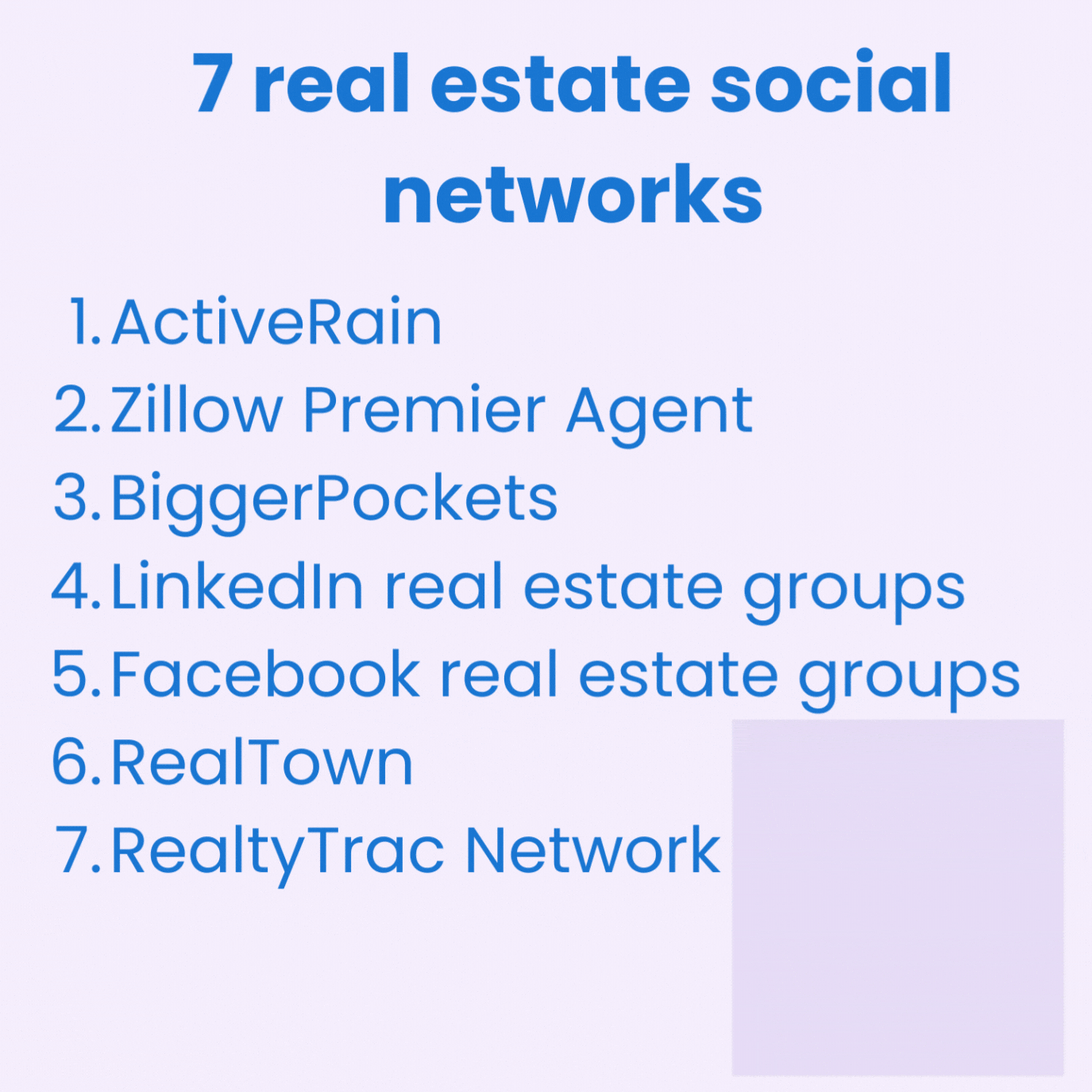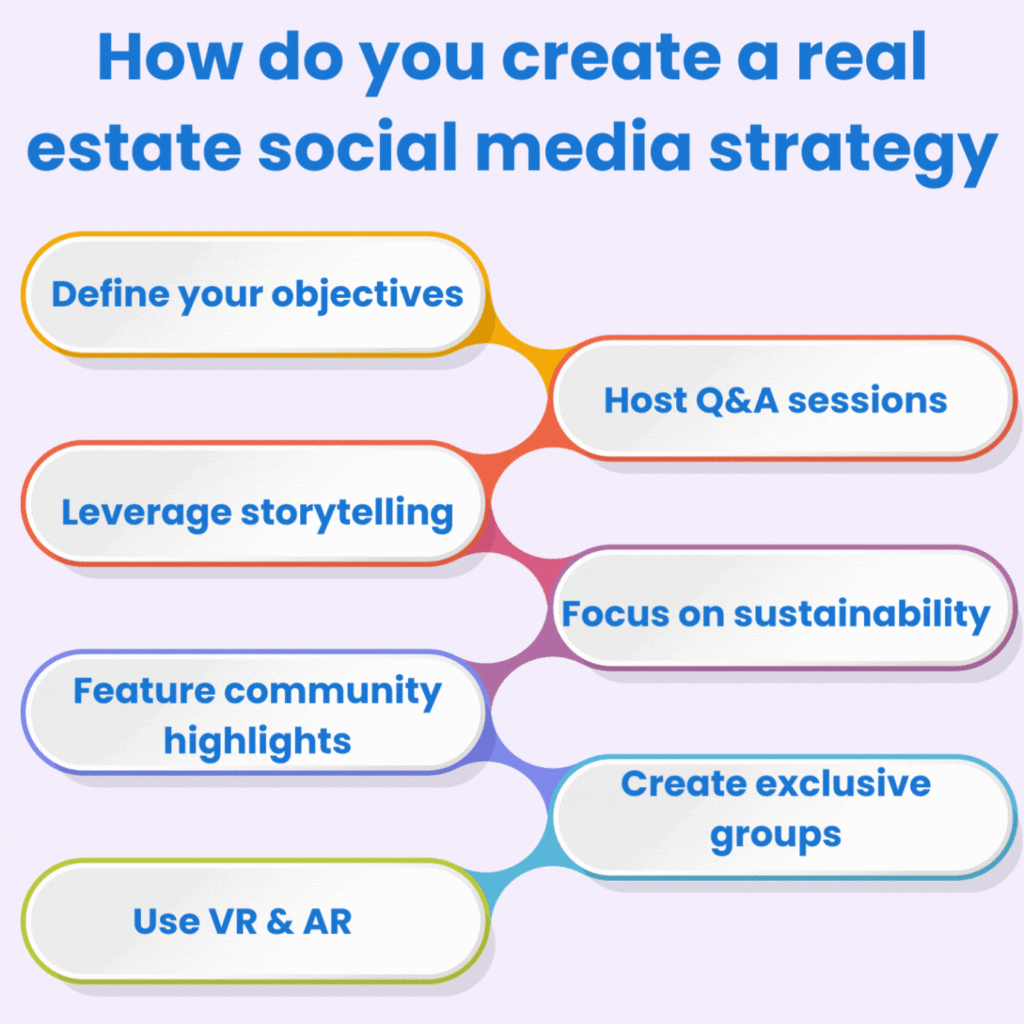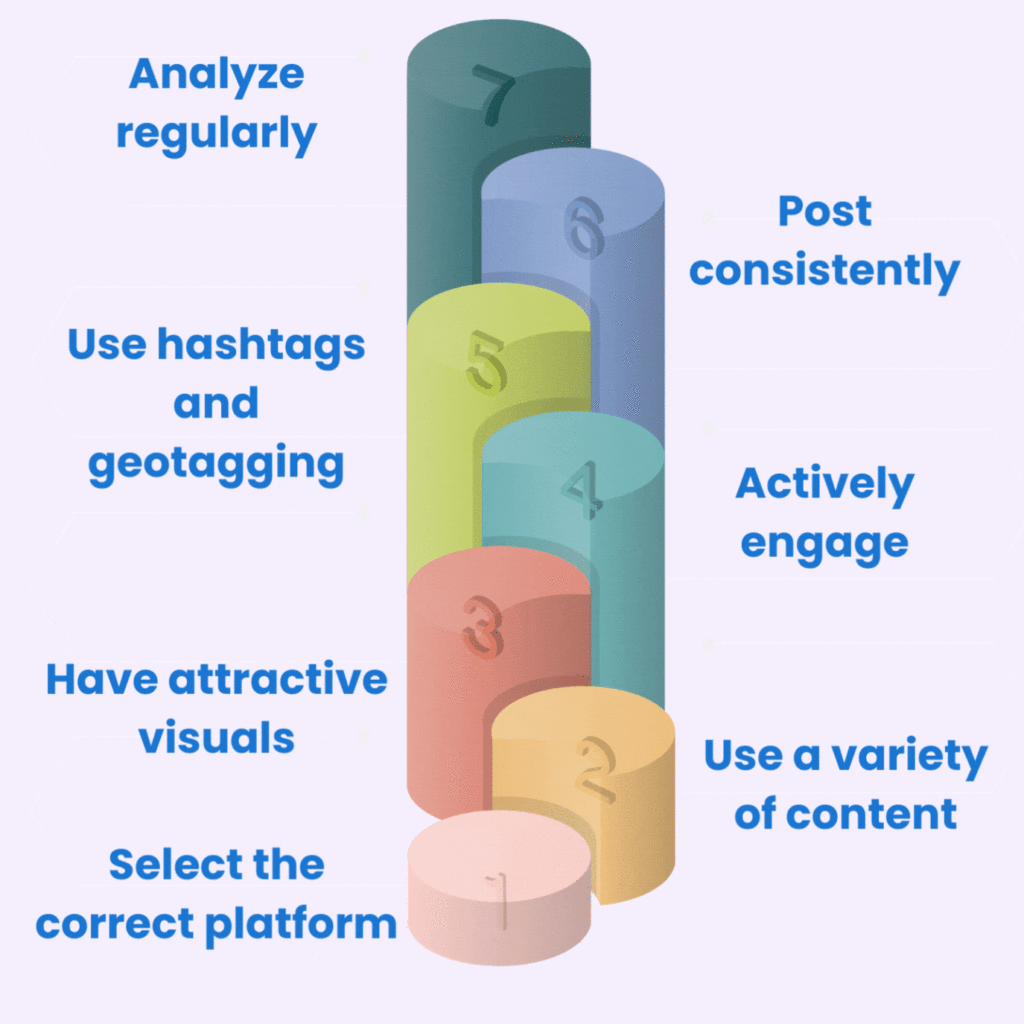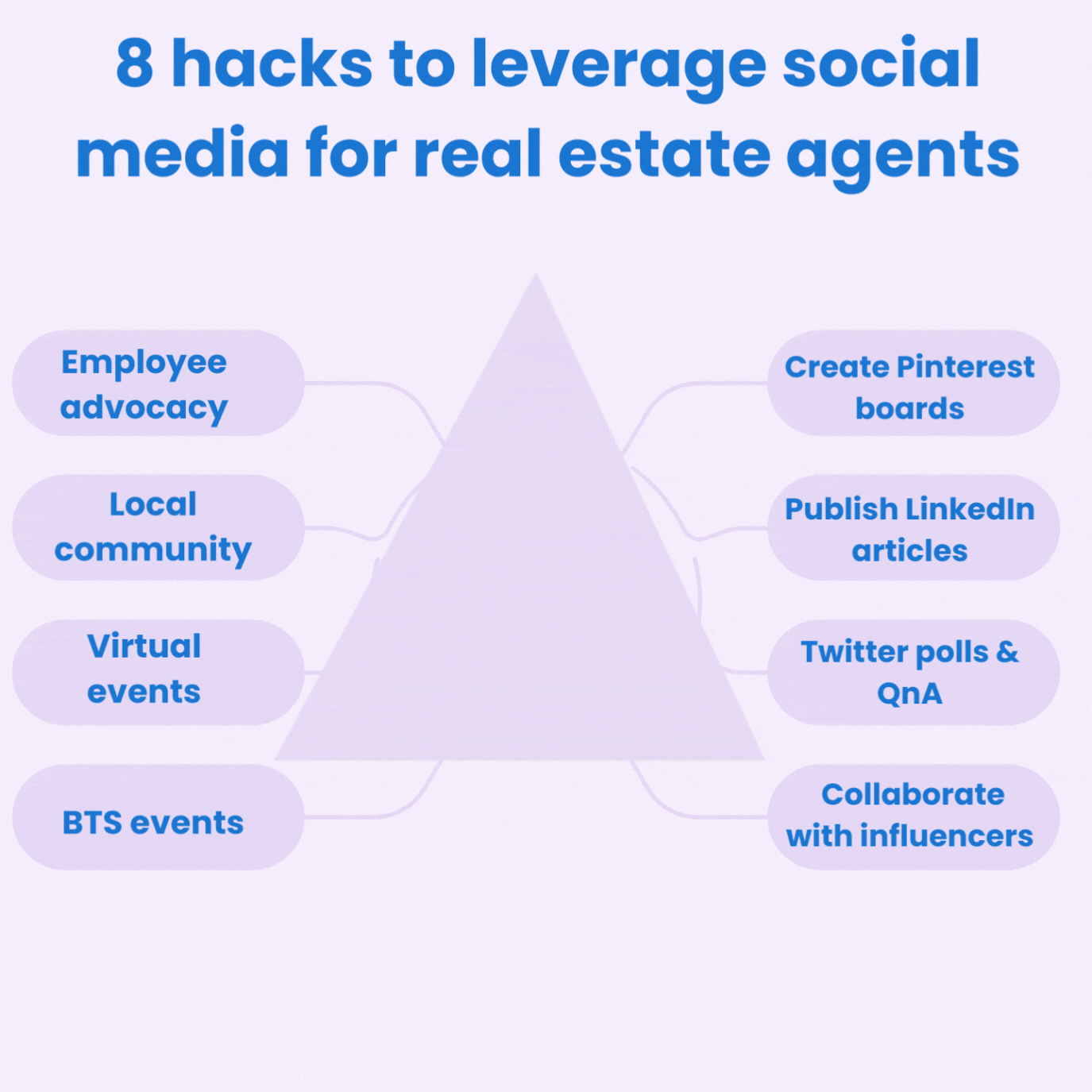In a recent survey of our expansive network of over 200,000 customers, it was discovered that 81% of businesses manage their social media strategies at the corporate level. This significant finding underscores the imperative need for real estate professionals to harness the power of social media to stay competitive and relevant in today’s market.
That’s why we’ve created this blog that features seven networks that every realtor should be a part of. These platforms can transform how you connect with clients and improve your real estate reputation management. You’ll learn how to craft a real estate social media strategy that’s not just good but great—bringing in new business.
This blog also covers:
- 13+ hashtags to increase your visibility
- 10+ insider tips that’ll escalate your real estate marketing
- 7+ smart hacks to help real estate agents make the most out of social media
Let’s explore how to leverage real estate social networks to your advantage!
Table of contents
- What are the 7 best social media networking groups for real estate marketing?
- Benefits of social media in real estate
- How do you create a real estate social media strategy that brings in new business?
- How can real estate agents effectively use social media for marketing?
- Tips to excel at real estate social media marketing
- 12 best practices for real estate agents
- 8 hacks to leverage social media for real estate agents
- Dos and don’ts of social media marketing for real estate
- Role of customer reviews in real estate social media marketing
- FAQs on real estate social networks
- Maximize your real estate social network reach with Birdeye Social
What are the 7 best social media networking groups for real estate marketing?
Real estate social media networking groups are specifically designed for professionals in the real estate industry to connect, share insights, and market their listings. Utilizing these networks can significantly enhance your marketing ROI by targeting a more relevant audience.
Here are seven real estate social networks that can help amplify your marketing efforts:
- ActiveRain
- Zillow Premier Agent
- BiggerPockets
- LinkedIn real estate groups
- Facebook real estate groups
- RealTown
- RealtyTrac Network
Let’s discuss what makes them unique real estate social networks:

1. ActiveRain
This is one of the largest networks for real estate professionals, offering a platform to share knowledge, connect with peers, and engage in discussions.
Members can blog, share tips, and learn from others’ experiences, making it a valuable resource for enhancing visibility and establishing expertise in the field.
Here are a few tactics to help you get the most from your time on ActiveRain:
- Engage actively by commenting on others’ posts and sharing your insights, which can increase your visibility within the community.
- Publish original content regularly, focusing on your expertise, local market analysis, or helpful tips for buyers and sellers to establish yourself as a thought leader.
2. Zillow Premier Agent
While Zillow for realtors is well-known for listing properties, its Premier Agent network allows exclusive advertising on the platform for real estate professionals, increasing their visibility to potential clients. It’s a powerful tool for generating leads and showcasing listings.
Here are a few tactics to help you get the most from your time on Zillow Premier Agent:
- Fully complete your profile, including past sales and client reviews, to build credibility.
- Utilize the CRM tools provided by Zillow to follow up on leads promptly and keep track of your interactions with potential clients.
3. BiggerPockets
This network is geared towards real estate investors and provides a platform for learning, networking, and marketing. It’s an excellent resource for property investors, offering forums, blogs, podcasts, and educational resources.
A few tactics to help you get the most from your time on BiggerPockets:
- Participate in forums by providing valuable advice and insights to build your reputation, particularly in areas where you have expertise.
- Network with other professionals and potential investors by engaging in meaningful conversations and sharing your experiences.
4. LinkedIn real estate groups
LinkedIn offers a variety of real estate-specific groups where professionals can network, share insights, and learn from one another. These groups provide a professional environment for connecting with peers and potential clients.
A few tactics to help you get the most from your time on LinkedIn real estate groups:
- Share and contribute valuable content that can help solve common problems or provide insights into the real estate market.
- Connect with group members by sending personalized connection requests, mentioning your mutual interests or discussions within the group.
Learn how to create a LinkedIn Business Page that drives results.
5. Facebook real estate groups
Many real estate professionals use Facebook to join local and global real estate groups. These groups allow networking, sharing listings, and engaging with potential buyers or sellers, providing a broad platform for marketing efforts.
A few tactics to help you get the most from your time on Facebook real estate groups:
- Be active by answering questions, providing feedback, and sharing relevant listings or market news.
- Use Facebook’s live video feature to conduct virtual tours of your listings or to host Q&A sessions about the real estate market.
6. RealTown
This online community for real estate professionals offers forums, articles, and a directory of professionals. It’s a place to connect with peers, share knowledge, and build a presence in the real estate community.
A few tactics to help you get the most from your time on RealTown:
- Use the platform to share your knowledge and insights, contribute to forums, and comment on blog posts to increase your visibility.
- Create and share your blog posts to demonstrate your expertise and experience in the real estate industry.
7. RealtyTrac Network
This network provides detailed property information, including foreclosure and pre-foreclosure data, which can be invaluable for investors and real estate professionals. Members can access advanced tools and data to enhance their market analysis and decision-making processes.
A few tactics to help you get the most from your time on RealtyTrac Network:
- Utilize the platform’s tools and data to create detailed market analysis reports and share them with your network, showcasing your market knowledge.
- Engage with other users by commenting on their posts and sharing insights, building relationships that can lead to referrals or partnerships.
By leveraging these networks, real estate professionals can enhance their online presence, connect with relevant audiences, and increase their marketing ROI. Networking, sharing valuable content, and engaging with these communities can lead to more leads, sales, and opportunities in the real estate industry.
The Top Real Estate Social Networks Every Agent Should Know
Want to see the impact of Birdeye on your business? Watch the Free Demo Now.
Benefits of social media in real estate
There are unique and proven benefits of social media that real estate professionals can leverage to enhance their marketing strategies, improve client engagement, and achieve better results through their social media efforts:
- Targeted advertising
- Virtual tours and live viewings
- Instant communication
- Brand building
- Market insights
- User-generated content
Let’s discuss each of these in detail:

1. Targeted advertising
Social media management platforms let real estate agents target specific groups of people based on their interests, habits, and where they live. This targeted approach makes it easier to find potential buyers or renters, leading to more interaction and leads from these focused campaigns.
2. Virtual tours and live viewings
Social media enables agents to conduct live property tours or share pre-recorded virtual tours. AI in real estate marketing has proven especially beneficial when in-person viewings are challenging, increasing property exposure and keeping potential buyers engaged.
3. Instant communication
The direct messaging features of social media platforms enable real estate professionals to communicate instantly with potential clients. This quick communication increases interest and speeds up decisions, leading to faster replies to property questions and more interaction.
4. Brand building
Real estate agents can use social media to build a strong brand identity, showcasing their expertise, market knowledge, and customer service. This consistent branding helps attract new clients and retain existing ones, as demonstrated by increased referral rates and higher client loyalty.
5. Market insights
Social media provides real estate professionals real-time market insights and trends based on user interactions and content engagement. This information can guide marketing strategies and business decisions, leading to better-targeted campaigns and improved market positioning.

6. User-generated content
Encouraging satisfied clients to share their positive experiences on social media can be powerful testimonials and word-of-mouth marketing. Such user-generated content has boosted credibility and attracted new clients by showcasing real success stories and client satisfaction.
How do you create a real estate social media strategy that brings in new business?
Creating an effective real estate social media strategy involves a comprehensive approach that aligns with your business goals, engages your target audience, and optimizes your online presence.
Here’s a step-by-step guide to each of these:

Define your objectives
Start by identifying what you want to achieve with your social media presence. Common goals include generating leads, increasing brand awareness, engaging with the community, or establishing yourself as a market expert. Setting clear objectives will guide your content and activities on social media.
Leverage storytelling
Instead of just listing property features, tell a story about each property. Share anecdotes or highlight unique aspects that make a property special. Storytelling can create an emotional connection and make listings more memorable.
Check out the 25 Facebook bio ideas for real estate agents to make a strong impression
Feature community highlights
Showcase the neighborhoods where your properties are located by highlighting local businesses, parks, events, or attractions. This helps potential buyers visualize the lifestyle they could have in that area.
Use Augmented Reality (AR)
Implement AR features in your social media posts, allowing potential buyers to virtually place furniture in a property or visualize renovations. This can make your listings more interactive and engaging.
Host Q&A sessions
Regularly host live Q&A sessions on platforms like Instagram or Facebook to address real estate questions in real time. This can establish your authority in the field and build trust with your audience.

Create exclusive groups
Develop exclusive groups or communities for your past and current clients. This can foster a sense of exclusivity and community, allowing members to share experiences or receive first-hand information on new listings.
Focus on sustainability
Highlight properties with eco-friendly features or share tips on making homes more sustainable. With growing interest in environmental issues, this focus can appeal to a demographic prioritizing sustainability.
How can real estate agents effectively use social media for marketing?
Real estate social media marketing is an essential strategy for agents looking to expand their reach and engage with a broader audience. By leveraging social media platforms, real estate professionals can showcase their listings, share insights, and build relationships with potential clients.
Here’s how real estate agents can effectively use social media for marketing:
- Select the correct platform
- Use a variety of content
- Have attractive visuals
- Actively engage
- Use hashtags and geotagging
- Post consistently
- Use ads
- Analyze regularly
Now let’s discuss each of these in detail:

1. Select the correct platform
Choose the right platforms where your target audience is most active. While platforms like Instagram and Facebook are popular for their visual appeal and broad user base, LinkedIn can be ideal for connecting with other professionals and potential investors.
2. Use a variety of content
Post a mix of content that includes listings, market insights, tips for buyers and sellers, and personal insights to build a connection with your audience. This diversity in content can engage users and keep them interested in your page.

3. Have attractive visuals
Since real estate is highly visual, use high-quality photos and videos to showcase your listings. Virtual tours, live videos, and story features can provide an immersive experience for potential buyers.
4. Actively engage
Social media is not just about broadcasting your listings; it’s also about interaction. Engage with your followers through comments, messages, and live sessions. Answer their questions, provide valuable information, and show that you’re an expert.
5. Use hashtags and geotagging
Utilize relevant hashtags and geo-tagging to increase the visibility of your posts. Hashtags related to real estate, specific locations, and trending topics can help reach a wider audience.
Top real estate hashtags to increase visibility: #RealEstate #Realtor #RealEstateAgent #RealtorLife #HomeForSale #JustListed #LuxuryRealEstate #OpenHouse #HouseHunting #InvestmentProperty #LocationLocationLocation #NewHome #RealEstateAdvice #RealEstateLife #RealEstateMarket #PropertyManagement
6. Post consistently
Post consistently, but avoid spamming your followers. Analyze the best times to post based on when your audience is most active to maximize engagement and visibility. Integrate online reviews into your social media strategy.
7. Use sponsored ads
Utilize social media advertising to target specific demographics, locations, and interests. Ads can help amplify your reach and attract more leads to your listings or services.
8. Analyze regularly
Use the analytics tools provided by social media platforms to track your performance, understand your audience, and adjust your strategy accordingly. Monitoring metrics such as engagement rates, click-through rates, and follower growth can provide insights into what content resonates with your audience.
By incorporating these strategies into their social media marketing efforts, real estate agents can enhance their online presence, attract more leads, and boost their sales.
Social media offers a dynamic platform for real estate professionals to showcase their expertise, connect with clients, and stay ahead. Below we share some proven tips to excel at real estate social media marketing.
Tips to excel at real estate social media marketing
To excel in real estate social media marketing and truly leverage the platforms available, here are some targeted tips and hacks that can significantly enhance the effectiveness in reaching potential customers:
- Define your target audience
- Create a content calendar
- Showcase your expertise
- Utilize Stories and Live features of different social media platforms
- Highlight customer testimonials
- Invest in professional photography
Must-read: Top 10 real estate agent review samples you need to see
12 best practices for real estate agents
Here are some best practices for real estate agents to enhance their professionalism, improve client relations, and increase their success in the industry:
- Build strong relationships
- Stay informed and educated
- Leverage technology
- Professional networking
- Effective marketing
- Responsive communication
- Ethical practices
- Client-centric approach
- Attention to detail
- Self-promotion and branding
- Follow-up and aftercare
- Manage your online reputation
Let’s discuss each in detail:
1. Build strong relationships
Develop genuine relationships with your clients, understanding their needs and preferences. Communication, trust, and transparency are key to building lasting relationships.
2. Stay informed and educated
Keep up-to-date with the latest real estate trends, market conditions, and legal requirements. Continuous education can help you provide better advice and make informed decisions.
3. Leverage technology
Utilize the latest real estate technologies to streamline processes, improve client interactions, and market properties more effectively. This includes CRM systems, virtual tour software, and real estate apps.
4. Professional networking
Engage with other real estate professionals, join industry associations, and attend events. Networking can lead to referrals, partnerships, and insights into market trends.
5. Effective marketing
Develop a comprehensive marketing strategy that includes digital marketing, social media, traditional advertising, and personal branding to promote listings and your real estate services.
6. Responsive communication

Be prompt in responding to client inquiries, concerns, and feedback. Effective communication can significantly enhance client satisfaction and lead to referrals and repeat business.
7. Ethical practices
Adhere to the highest ethical standards, respect client confidentiality, avoid conflicts of interest, and be honest in all transactions. Integrity is crucial in building trust and maintaining a positive reputation.
8. Client-centric approach
Always prioritize the needs and interests of your clients. Providing exceptional service and going above and beyond can differentiate you in a competitive market.

9. Attention to detail
Be meticulous in contracts, negotiations, and property presentations. Attention to detail can prevent misunderstandings and ensure smooth transactions.
10. Self-promotion and branding
Develop a strong personal brand that reflects your values, expertise, and unique selling proposition. Consistent branding across all touchpoints can enhance your visibility and appeal to potential clients.
11. Follow-up and aftercare
Maintain contact with clients even after transactions are complete. Follow-ups and aftercare can lead to repeat business and referrals.
12. Manage your online reputation
Monitor and manage your online reviews and presence. A positive online reputation can influence potential clients’ decisions to work with you.
Social media marketing practices that real estate agents should avoid: 1. Ignoring audience engagement and not responding to comments or messages. 2. Sharing confidential or sensitive client information. 3. Posting low-quality images or videos. 4. Using inconsistent branding across different platforms. 5. Neglecting to check and adhere to each platform's specific guidelines.6. Posting identical content across all platforms without adaptation. 7. Ignoring negative feedback or reviews.
8 hacks to leverage social media for real estate agents
Here are some unique and real-estate-specific hacks for agents looking to leverage social media:

1. Leverage employee advocacy
Encourage your team to share your content and listings on their personal social media profiles to extend your reach.
2. Be vocal on local community pages
Engage with local community groups or pages on platforms like Facebook. Share relevant content, answer real estate questions, and establish yourself as the go-to real estate expert in the community.
3. Host virtual open houses and webinars
Use platforms like Facebook Live or Instagram Live to host virtual open houses or educational webinars. This can attract a broader audience and provide interactive opportunities for potential buyers.
4. Utilize Instagram Stories for Behind-the-Scenes
Share behind-the-scenes content of your day as a real estate agent, staging a home, or neighborhood tours. This can add a personal touch and build a stronger connection with your audience.
5. Create Pinterest boards for different categories
Use Pinterest to create boards for different types of properties, interior design inspiration, or neighborhood features. This can attract individuals in the research phase of buying a home.
6. Publish LinkedIn articles for market analysis
Publish in-depth market analysis or trend reports on LinkedIn. This platform is ideal for showcasing your expertise to a professional audience and can help you engage with investors or high-net-worth individuals.
7. Implement Twitter polls and Q&A sessions
Use Twitter to run polls about real estate preferences or host Q&A sessions. This can increase engagement and provide valuable insights into your audience’s preferences.
Did you know the best times to post on Twitter for your business?
8. Collaborate with influencers or local celebrities
Partner with local influencers or celebrities to showcase your properties or to talk about the real estate market. Their endorsement can amplify your reach and credibility.
Unlock the potential of your real estate social network with Birdeye's affordable solutions. Visit our pricing page to explore how Birdeye can amplify your online visibility and engagement within your budget.
Dos and don’ts of social media marketing for real estate
Following these dos and don’ts can help real estate professionals build a strong, effective, and respectful social media presence that enhances their brand and engages their audience:
| Dos for social media marketing for real estate agents | Don’ts for social media marketing for real estate agents |
| Do create a content calendar. Plan your posts in advance to maintain a consistent and strategic presence. | Don’t spam your followers. Avoid overwhelming your audience with too many posts in a short period. |
| Do use high-quality visuals. Share professional photos and videos to showcase properties effectively. | Don’t ignore the rules of each platform. Understand and respect the specific guidelines of each social media site. |
| Do engage with your audience. Respond to comments, messages, and engage in conversations to build relationships. | Don’t use overly salesy language. Avoid being too pushy in your posts; focus on providing value and building connections. |
| Do utilize social media ads. Leverage targeted advertising options to reach a broader or more specific audience. | Don’t post sensitive information. Respect client privacy and confidentiality at all times. |
| Do measure and analyze your results. Use analytics to understand what’s working, and adjust your strategy accordingly. | Don’t neglect your profiles. Inconsistent posting or outdated information can harm your credibility. |
| Do show your personality. Let your audience get to know you, building trust and rapport. | Don’t be unprofessional. Always maintain a professional demeanor, even in informal settings like social media. |
| Do share testimonials and success stories. Highlight positive experiences and outcomes to build credibility. | Don’t forget to proofread. Avoid posting content with spelling or grammatical errors that can detract from your professionalism. |
| Do offer valuable information. Share insights, tips, and relevant news that can benefit your audience. | Don’t mix personal and professional content. Keep your business account focused on real estate-related content. |
| Do stay updated with the latest trends. Adapt your strategy to incorporate new features and best practices. | Don’t ignore feedback. Take both positive and negative feedback seriously and use it to improve. |

Role of customer reviews in real estate social media marketing
Customer reviews play a pivotal role in real estate social media marketing because they influence potential clients’ perceptions. Positive reviews differentiate you from other agents, highlighting your unique value proposition and expertise.
Here’s how customer reviews impact real estate social media marketing:

- Trust and credibility
Positive reviews build trust and credibility with potential clients. They serve as testimonials to the quality of your service and success in meeting client needs.
- Social proof
Reviews act as social proof, influencing potential clients’ decisions. People are likelier to trust and choose real estate agents with numerous positive reviews.
- Enhanced visibility
Businesses with higher ratings and reviews tend to rank better on many platforms and be more visible in search results and recommendations.
- Informed decision-making
Reviews provide insights into the experiences of past clients, helping potential clients make informed decisions about choosing you as their agent.
- Feedback and improvement
Reviews offer valuable feedback, allowing agents to identify areas of strength and those needing improvement, ultimately enhancing service quality.

FAQs on real estate social networks
Real estate social networks are online platforms where professionals can connect, share insights, and market properties. They’re tailored for industry-specific engagement and networking.
Agents can use social media to showcase properties, share market insights, engage with clients, and build their brand by posting relevant content and interacting with their audience.
The best platforms include Facebook, Instagram, LinkedIn, and Pinterest, offering various tools for visual storytelling, networking, and targeted advertising.
Posting frequency can vary, but it’s crucial to maintain a consistent schedule. Most experts recommend posting several times weekly to keep followers engaged and informed.
Yes, social media can significantly impact sales by increasing property visibility, generating leads, and establishing trust with potential clients through regular engagement and valuable content.
Agents should share a mix of property listings, industry news, educational content, and behind-the-scenes looks at their work to engage and inform their audience effectively.
To optimize profiles, professionals should ensure their information is complete and up-to-date, use professional profile photos, showcase their achievements, and regularly share relevant and valuable content to engage their audience.
Professionals can use analytics to track engagement, reach, and conversion rates, identifying what content resonates with their audience. This data helps refine strategies, focusing on effective tactics and improving ROI.
Agents can maintain professionalism by being respectful and ethical, while authenticity can be achieved by sharing personal insights, experiences, and stories that connect with their audience on a human level.
Agents should watch for trends like increased use of video content, virtual tours, AI-driven personalization in marketing, and leveraging newer platforms like TikTok to reach a broader audience.
Maximize your real estate social network reach with Birdeye Social
These real estate social networking platforms are invaluable tools for realtors aiming to enhance their online presence, engage with potential clients, and showcase their listings effectively. Integrating a robust social media strategy is beneficial and essential for success in today’s digital landscape.
This is where Birdeye Social offers a comprehensive solution to manage your real estate social media efforts efficiently. With Birdeye Social, you can:
- Manage all your social media interactions from one place
- Gain insights into your social media performance
- Monitor and respond to reviews across platforms
- Schedule your posts in advance across multiple networks
And many more!

Originally published









